Politics
Pro-Palestinian activists prepare to rally at Democratic convention in Chicago

He walked down a side street, eyes darting here and there, wondering how it would unfold.
“What kind of fences will the police have? Will they bring dogs?” Hatem Abudayyeh asked. He stopped in the shadow of the United Center, home of the NBA’s Bulls and the NHL’s Blackhawks and a draw for tens of thousands of pro-Palestinian demonstrators who are expected to protest against U.S. support for Israel at the Democratic National Convention this month. “I hope they don’t militarize it,” he said. “The first statement the police made was about mass arrests. They’ve backed off a little. But they’re trying to intimidate us.”
The son of Palestinian immigrants, Abudayyeh is one of the march’s organizers and has long been at the center of civil rights protests. He was investigated by the FBI more than a decade ago — no charges were brought — and in 2017 he helped block traffic at Chicago O’Hare International Airport over then-President Trump’s Muslim travel ban. The demonstration he is preparing comes as this onetime city of stockyards and slaughterhouses hopes it can avoid the chaos and police brutality that marked the antiwar protests that engulfed the Democrats’ convention here in 1968.
Hatem Abudayyeh, a longtime Palestinian activist and organizer, is preparing for a march on the Democratic National Convention at Chicago’s United Center this month.
(Alex Garcia / For The Times)
“Palestine is this generation’s Vietnam War,” Abudayyeh said, noting that more than 39,000 Palestinians, according to Gaza health authorities, have been killed by Israeli forces since Hamas attacked Israel in October. “We’re unabashed about the Palestinian right to self-defense to end Israeli genocide. We have momentum. I don’t think we’ll lose any steam with [President] Biden out of the race. Kamala Harris and other Democrats are still backing Israel.”
Abudayyeh’s parents emigrated from the Israeli-occupied West Bank village of Al Jib and settled on Chicago’s North Side in the 1960s. Both were activists and community leaders, who on Sundays drove their son to Arab neighborhoods on the South Side so he would know his lineage and learn that social change comes from sacrifice and solidarity. That lesson has kept him on the front lines of hundreds of demonstrations. But few as consequential as the national stage he and his compatriots from more than 150 organizations will find themselves on when an energized Democratic Party arrives here with the expectation of nominating Harris for president.
“I don’t feel there’s anything to lose,” said Abudayyeh, 53, a large man with glimmers of gray in his beard who calls himself an “anti-imperialist” and sounds at times like a provocateur from a long-ago newsreel. “We’ve already dealt with political repression. We know the feds are here and will be crawling up and down Chicagoland.”
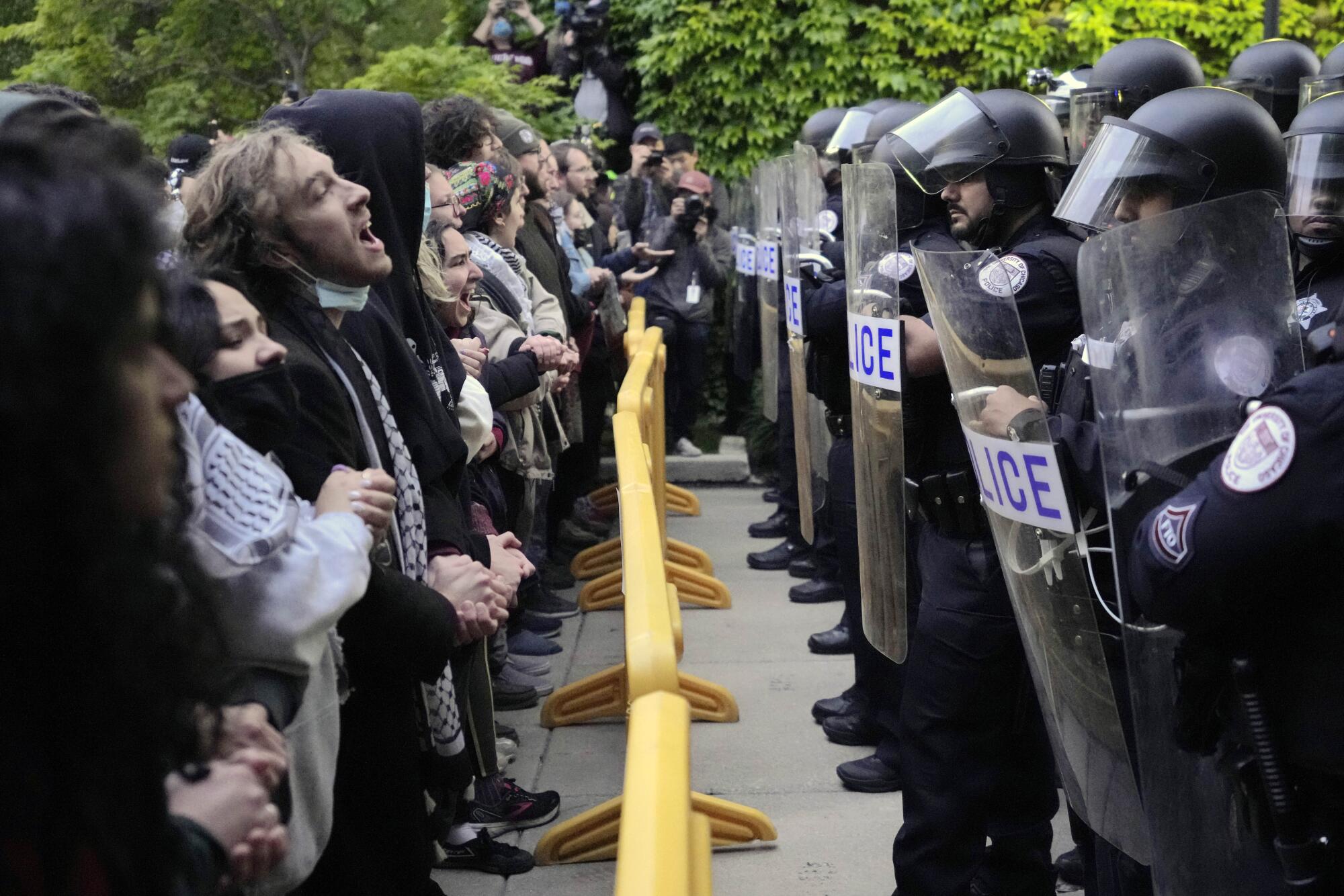
Pro-Palestinian protesters chant at University of Chicago police officers as a student encampment is dismantled in May.
(Charles Rex Arbogast / Associated Press)
The Chicago Police Department has been training to de-escalate threats of unrest at the convention and is calling in hundreds of law enforcement officers from across the state for backup. The department — just weeks after a Fourth of July weekend that saw more than 100 shootings citywide — is under intensifying pressure over security after the assassination attempt on Trump at a Pennsylvania rally last month. This comes after a 2021 report by the city’s Office of Inspector General found the department was marred by confusion and intelligence failures during violence related to the George Floyd protests a year earlier.
The police will “not only allow everyone who comes here to express their 1st Amendment rights, but we will protect their rights while doing it,” department Supt. Larry Snelling told reporters recently. “What we will not tolerate is vandalism to our city. What we will not tolerate is violence.”
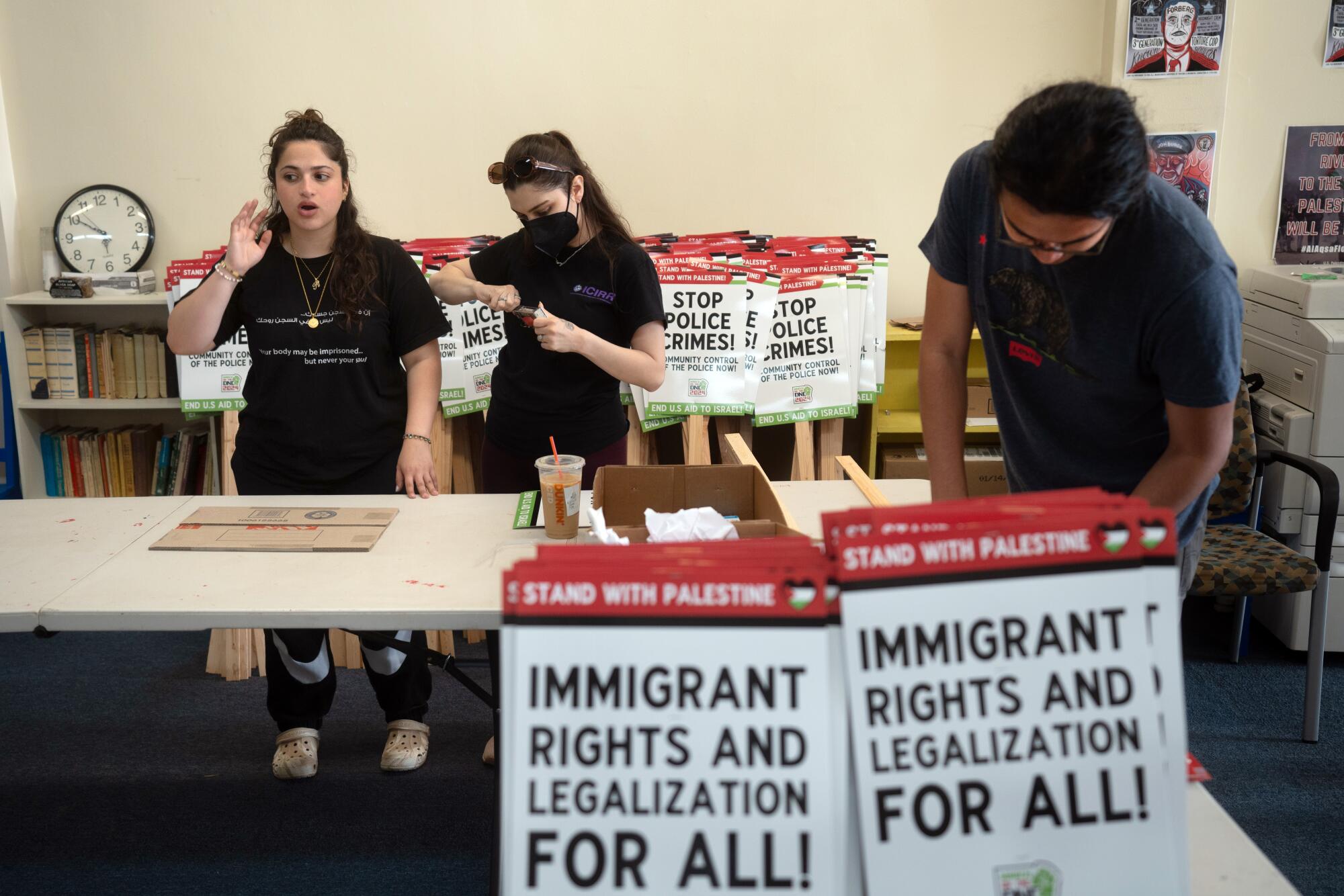
Activists at the Chicago Alliance Against Racist and Political Repression prepare protest signs for demonstrations at the Democratic National Convention.
(Alex Garcia / For The Times)
The overall goal of the protest — organizers have condemned the Democratic Party as being “a tool of billionaires and corporations” — is ending U.S. military aid to Israel and the creation of an independent Palestinian state. That same demand ignited demonstrations that shook college campuses in the spring. But the protesters in the March on the DNC 2024 come from many causes, including immigrant, reproductive and LGBTQ+ rights, anti-racist networks and those seeking to stop police repression in minority communities.
“We are in unconditional solidarity with the Palestine liberation movement,” said Frank Chapman, a mentor to Abudayyeh and field organizer and education director of the Chicago Alliance Against Racist and Political Repression. “Our political destinies are entwined. All those billions of dollars going to Israel could be used to build up America and reverse the injustices against Black Americans. You can’t have a war on poverty and at the same time perpetuate genocide overseas.”
Activists stapled together protest signs on a recent evening at the alliance’s South Side headquarters, where a picture of Malcolm X hung on the wall, and outside, not far from the L train, a man carried an open bottle in a crumpled bag and wandered beneath a sign for Living Hope Church and a lawyer’s billboard that read, “Call Top Dog.” The activists ranged in age from students to a gray-haired man; they moved swiftly and quietly stacking signs near the windows like a small army waiting to advance.
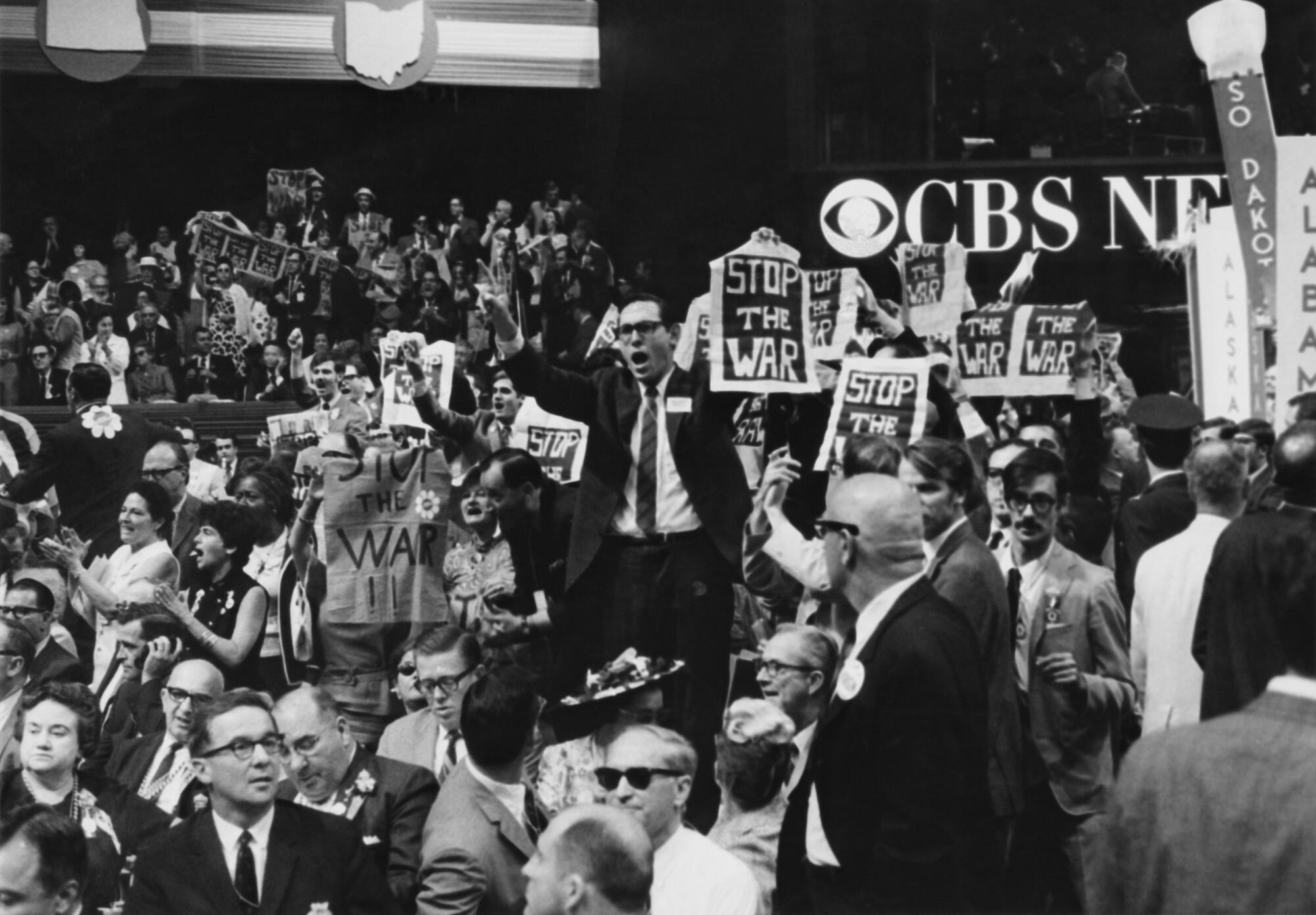
New York delegates protest U.S. involvement in the Vietnam War on the floor of the 1968 Democratic National Convention in Chicago.
(Getty Images)
“It feels like we’re building something,” Adrian Gallegos, a computer science major at the University of Illinois Chicago, said next to rows of “Stop Police Crimes” signs. The air was sharp with the spirit of rebellion, as if one were listening to Jimi Hendrix while eavesdropping on the 1960s anti-establishment musings of Black Panther deputy chairman Fred Hampton or Yippie activist Abbie Hoffman.
“The system has been exploiting and oppressing people for 400 years,” said Kobi Guillory, co-chair of the Chicago alliance. “It’s inevitable it will crumble under the weight of its own contradictions.”
The 1968 peace movement “was a mostly white-led movement. This is not,” said Chapman, a revered figure in the city’s civil rights scene for half a century. “The struggle for peace today is more multi-ethnic and multi-international. It is broader and deeper than the antiwar movement around Vietnam. This will lead to a political realignment for people of color and working-class white people who want change.”
Abudayyeh sees similarities to and contrasts with 56 years ago. The 1968 convention followed Democrat incumbent Lyndon B. Johnson’s decision not to seek another term; this year Biden dropped out of the race. Then and now, the Democrats were divided over unpopular wars. But the Israel-Hamas war is different from the Vietnam War, which consumed the American imagination for years, killing more than 58,000 U.S. service members and an estimated 2 million to 3 million Vietnamese. Israel’s bombardment of the Gaza Strip is supported by U.S. military aid, but Washington has not declared war, and no American soldiers are dying.
What’s more, the politics of Chicago and the country are not the same as in 1968, when the nightly news echoed with reports of rioting and the assassinations of Robert F. Kennedy and the Rev. Martin Luther King Jr. Back then, Chicago Mayor Richard J. Daley, who was known as “the Boss,” ordered a clampdown on dissent, and police attacked protesters with billy clubs and tear gas, leaving hundreds arrested or injured. Current Mayor Brandon Johnson is a progressive and onetime union organizer who has supported activists and in June ordered a task force to study making reparations to Black residents.
The protests at this year’s convention will confront a troubled and distracted land. The assassination attempt against Trump, Biden’s departure, the rise of Harris and battles over abortion, inflation, book banning, housing prices and other issues have left many Americans inward-looking and dispirited about the future. But Abudayyeh said the injustices against Palestinians are visceral enough to force Democrats, including Harris, who has been more forceful than Biden in criticizing Israel for creating a “humanitarian catastrophe” in the Gaza Strip, to take notice of the marchers’ demands at the convention.
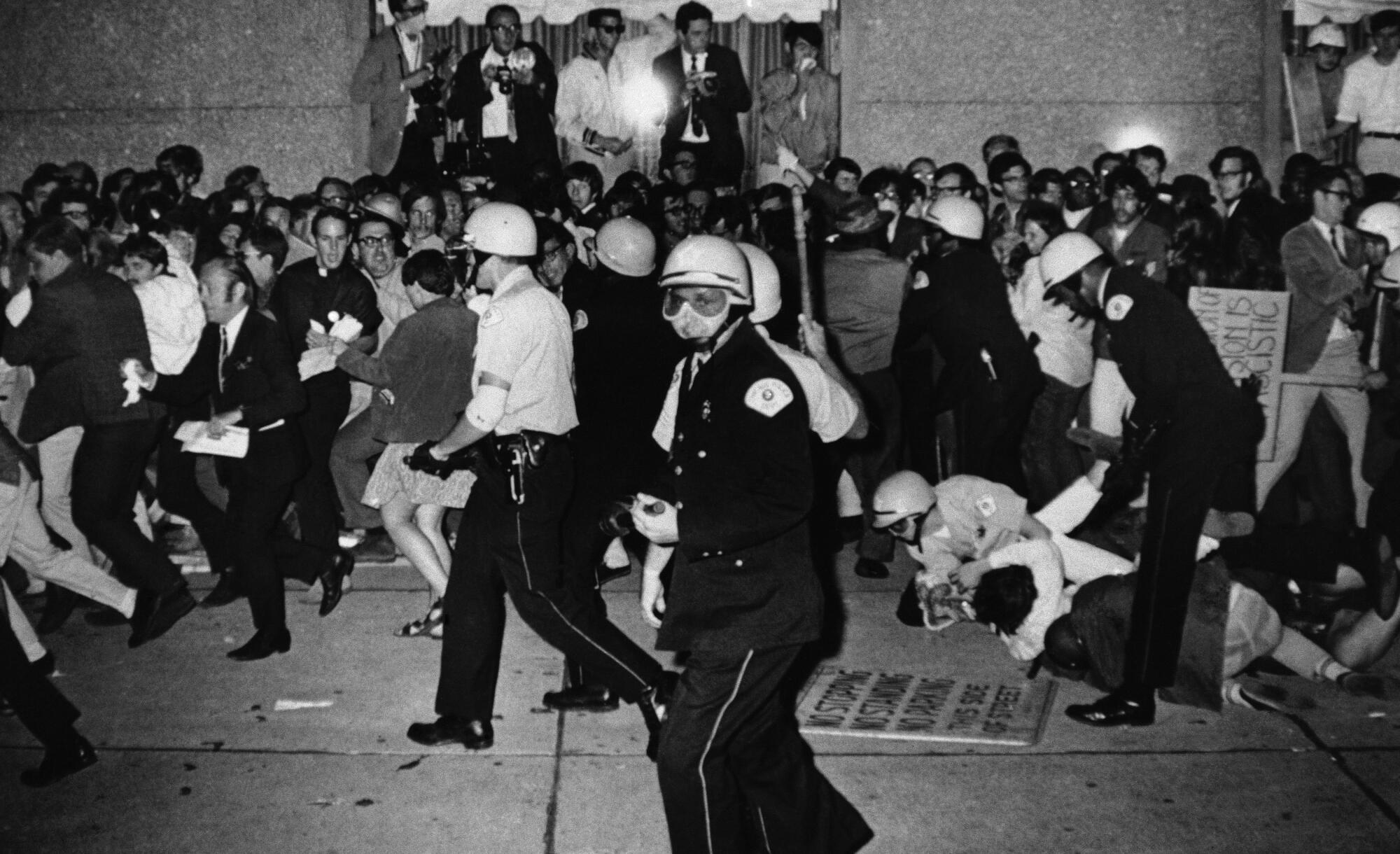
Chicago police officers forcefully disperse demonstrators outside the Democratic National Convention on Aug. 29, 1968.
(Michael Boyer / Associated Press)
“Yes,” he said, “the timing is right.”
The other day, Abudayyeh, wearing a face mask after a bout with COVID-19, drove beyond his office at the Arab American Action Network, where he is executive director, to an Arab neighborhood of sweet shops, jewelry stores and beauty academies. The streets and swirling dialects connected him to Palestinians, like his deceased parents, who emigrated here after Middle East wars and Israel’s occupation of the West Bank.
“They always wanted to return home, but [Palestinians are] now an established presence in Chicago,” said Abudayyeh, who has a daughter, and is also national chair for the U.S. Palestinian Community Network. “It took my parents 25 years to buy a house and give up on the dream of going back.”
The conversation, as often with Abudayyeh, who seems to be in many places at once, turned in a new direction. Protest organizers, he said, have been in a months-long struggle with the city on a route that would allow demonstrators to march close to the United Center.
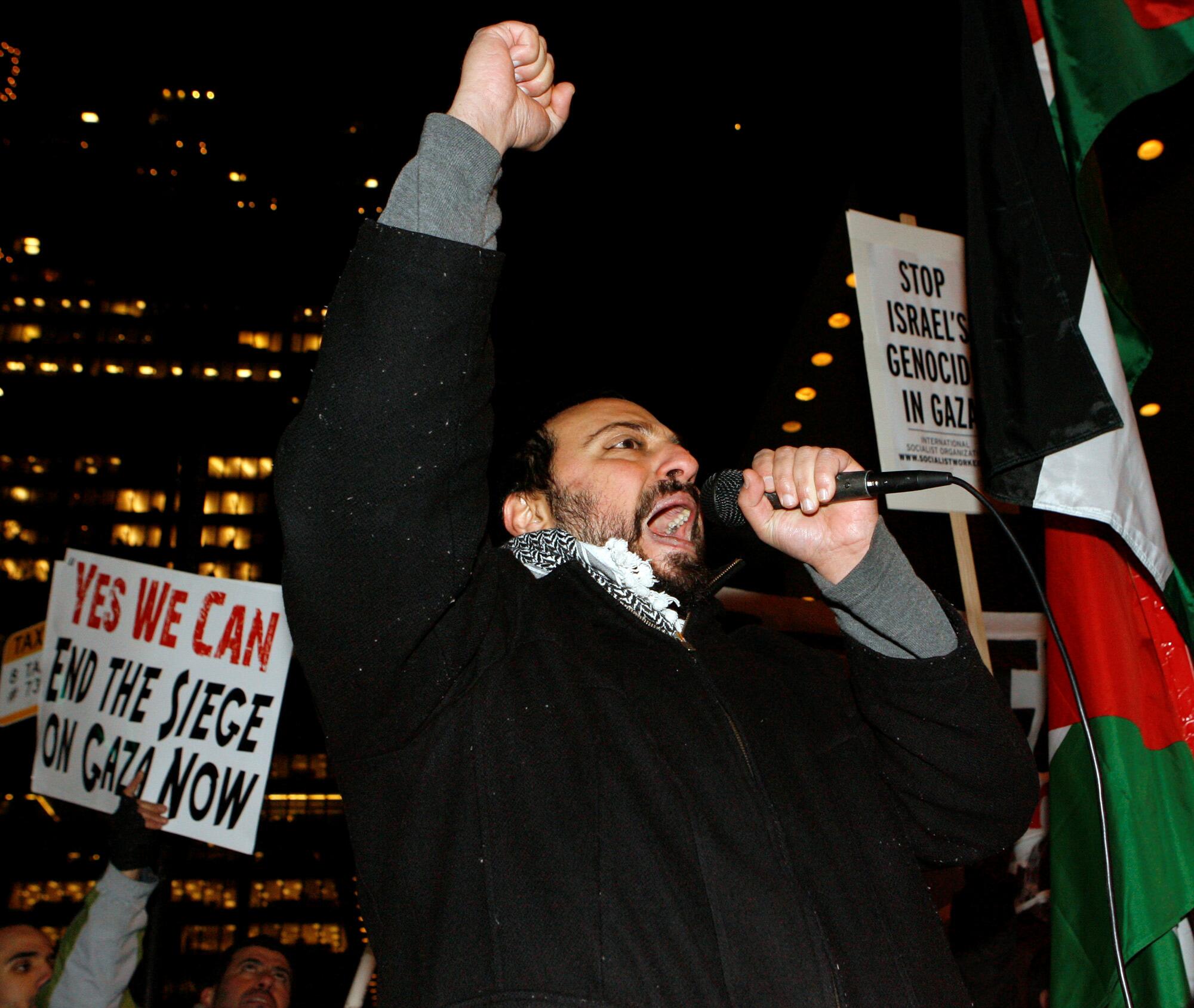
Hatem Abudayyeh speaks in downtown Chicago in January 2009, protesting against Israeli military actions in the Gaza Strip.
(Nam Y. Huh / Associated Press)
“We’re making progress,” he said. “When we first filed for a permit, the city wanted to keep us four miles away from the center.” The new plan allows protesters to gather at and march from Union Park, several blocks from the site. “We’re within sight and sound,” he said, “but they’re not giving us a long enough route to accommodate tens of thousands of people.”
Abudayyeh is accustomed to the reach of the state. Two years after working with antiwar activists at the 2008 Republican National Convention in St. Paul, Minn., the FBI raided his home, seizing computers, files, books and documents. His bank accounts were frozen. The sweep was part of an investigation into about two dozen activists in the Midwest suspected of supporting international terrorist organizations. Abudayyeh was targeted over helping arrange delegations to Gaza and the West Bank of activists opposed to Israeli occupation.
He said he had no connection to militant groups. Months earlier, he had been invited to the Eisenhower Executive Office Building, next to the West Wing of the White House, for an outreach meeting for Arab Americans. Activists and community leaders came to his defense. He refused to answer a grand jury subpoena, and more than two years later his confiscated materials were returned and no charges were filed.
“This is a massive escalation of the attacks on people that do Palestine support work in this country and antiwar work,” he said at the time. “We’re not going to stop speaking out against U.S. support of Israel’s violations of the Palestinian people.”
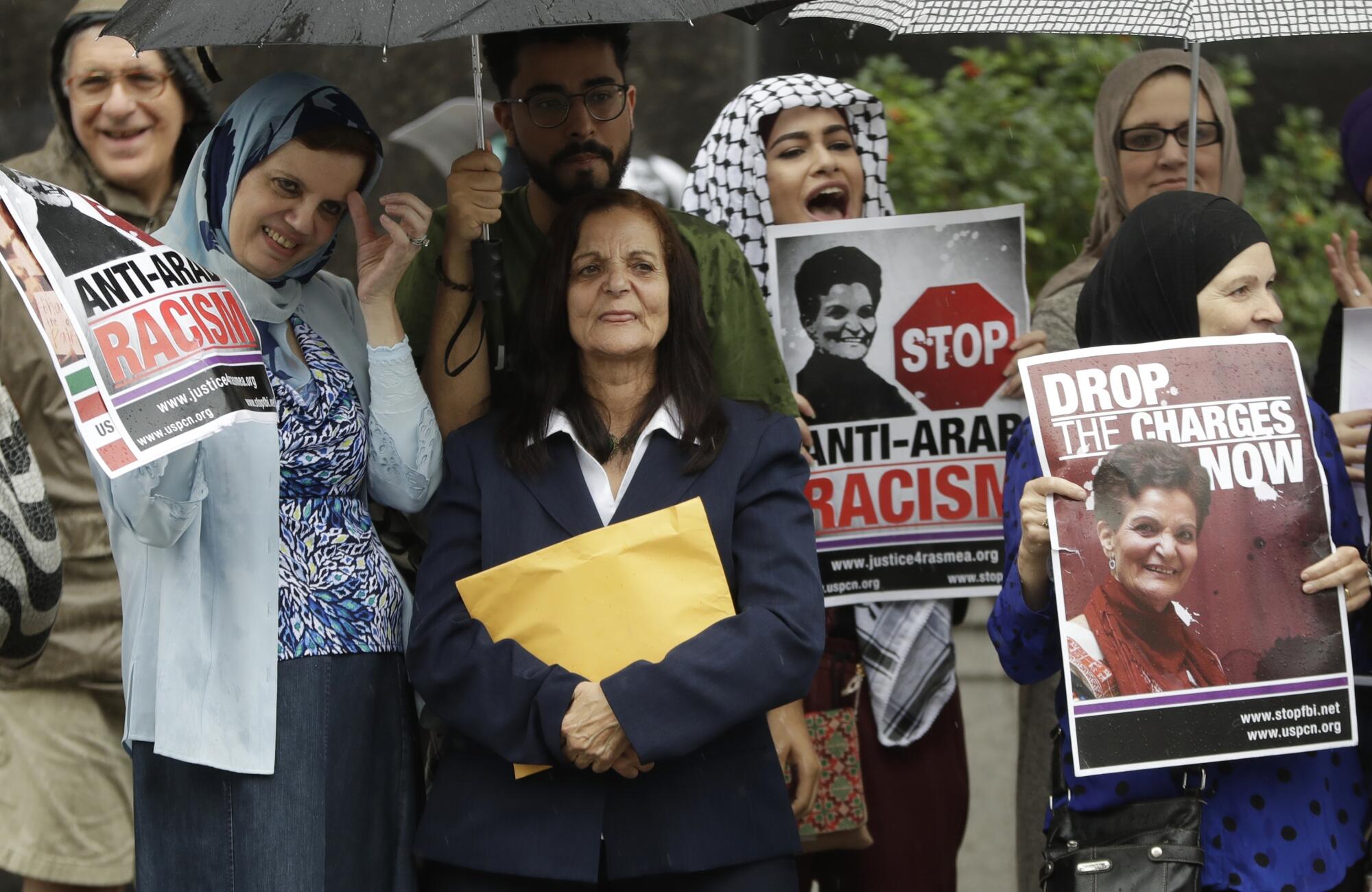
Abudayyeh coordinated the defense committee in 2017 for Rasmea Odeh, a Palestinian activist imprisoned in Israel for her involvement in two bombings in Jerusalem in 1969. Above, Odeh is joined by supporters outside a federal courthouse in Detroit in 2017.
(Carlos Osorio / Associated Press)
Abudayyeh’s statements and sentiments are often provocative in an age when some protesters against the Gaza war have been assailed as antisemitic or for espousing terrorism for their support of Hamas. He has called Hamas “a legitimate resistance force” and has said “the real terrorists are the governments and military forces of the U.S. and Israel.” When Iran retaliated against Israel with missiles and drones in April, Abudayyeh broke the news during an activist meeting, where a few in the crowd cheered.
In 2017, Abudayyeh coordinated the defense committee for Rasmea Odeh, a Palestinian activist imprisoned in Israel for her involvement in two bombings in Jerusalem in 1969. Odeh said she confessed after being tortured by the Israeli military. She was released in a prisoner swap a decade later and eventually moved to Chicago, where she was associate director of the Arab American Action Network. She became an American citizen but was deported after pleading guilty to not disclosing her criminal history to immigration officials.
Abudayyeh’s activism has been ingrained since childhood. His father, who worked for an insurance company, was a co-founder of the Arab Community Center, and his mother was Chicago chapter president for the Union of Palestinian Women’s Assns. He attended UCLA in the early 1990s, studying biology and English and hoping to join a progressive campus culture. Instead, he said, he found a mostly white and well-to-do population that was uninterested in activism, except for Latino students who taught him about the Chicano movement.
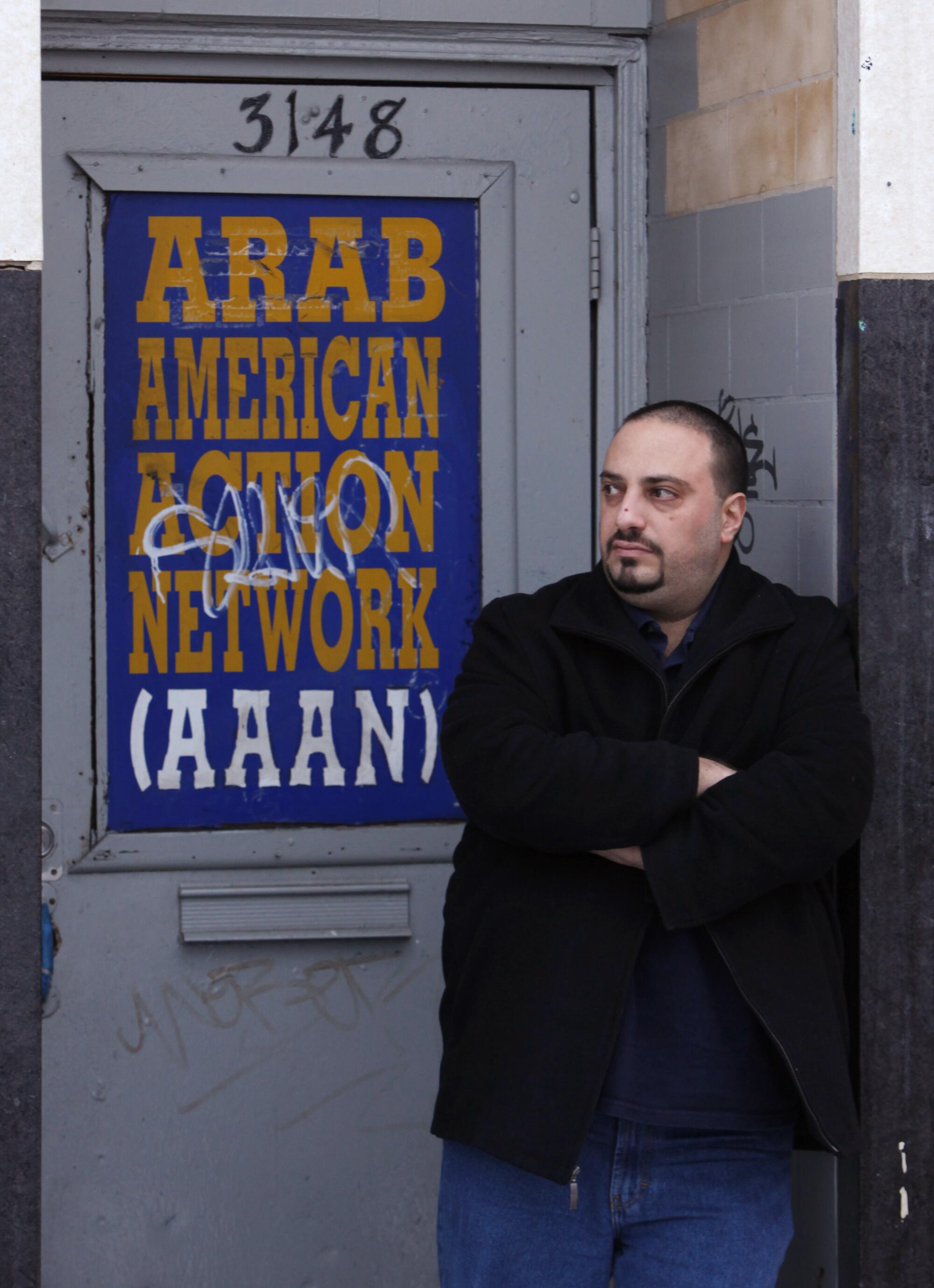
Abudayyeh stands outside the office of the Arab American Action Network in Chicago in 2011.
(Charles Rex Arbogast / Associated Press)
“I saw that social change wasn’t going to happen at UCLA,” he said, noting that that was no longer the case, given the university’s pro-Palestinian protests in recent months. He left campus and returned to Chicago, where he coached high school basketball and was increasingly drawn to civil rights issues and working with the Palestinian community. In 2002, he traveled to Jerusalem, Gaza and the West Bank as part of a program to teach young Arab and Palestinian Americans and others about the Israeli occupation so they could return to the U.S. to help organize for Palestinian independence.
“I came back from that trip transformed,” he said. “I think for a while I had felt diaspora guilt. I realized I had to commit more of my life to ending the occupation. I owed it to my parents and my grandparents and cousins of mine who did not have the opportunity I had to grow up in safety and security. They faced bullets and repression.”
The morning after his drive to the Arab neighborhood, Abudayyeh parked near Union Park and walked toward the United Center in west Chicago. He approached from a side street, wondering how close he could get during the convention. He talked logistics and spoke of the St. Paul Principles for protest — put together by activists at the 2008 Republican convention — that call for solidarity and opposing “any state repression of dissent including surveillance, infiltration, disruption and violence.”
The parking lots were empty. A local film crew was shooting video. “I know the camera guys,” he said. “The reporters don’t always come to our protests. But the photo guys do. They know me.” He turned and walked back toward Union Park. He mentioned that his father never finished college; he had children and relatives back in Al Jib to support. It was that way for many, he said, turning past First Baptist Church, his jeans frayed and cuffed, his T-shirt blowing in a hot breeze.
Marchers, he said, would be arriving from across the country in buses, trains and caravans. He predicted they would fill the park and swell into the streets. There were only weeks left to prepare. The sun was high and he was sweating. He pulled down his COVID mask and took a breath, disappearing into the shadows at the edge of the park and driving home for a few hours’ rest.
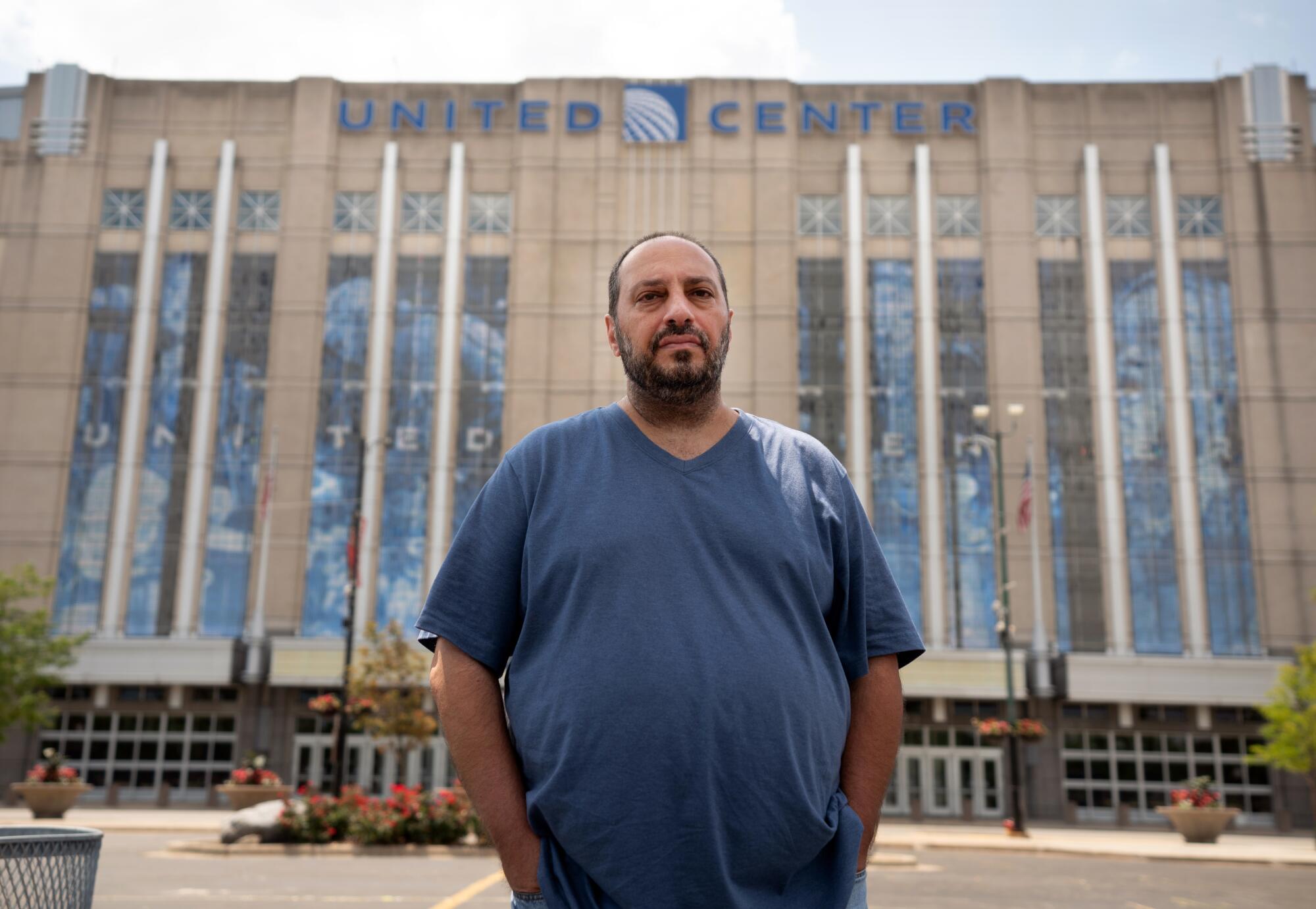
“I don’t feel there’s anything to lose,” Abudayyeh said about the upcoming protest in Chicago. “We’ve already dealt with political repression. We know the feds are here and will be crawling up and down Chicagoland.”
(Alex Garcia / For The Times)

Politics
Video: Protests Against ICE in Minneapolis Continue Into Friday Night

new video loaded: Protests Against ICE in Minneapolis Continue Into Friday Night
transcript
transcript
Protests Against ICE in Minneapolis Continue Into Friday Night
Hundreds of protesters marched through downtown Minneapolis on Friday night. They stopped at several hotels along the way to blast music, bang drums and play instruments to try to disrupt the sleep of immigration agents who might be staying there. Mayor Jacob Frey of Minneapolis said there were 29 arrests but that it was mostly a “peaceful protest.”
-
The vast majority of people have done this right. We are so deeply appreciative of them. But we have seen a few incidents last night. Those incidents are being reviewed, but we wanted to again give the overarching theme of what we’re seeing, which is peaceful protest. And we wanted to say when that doesn’t happen, of course, there are consequences. We are a safe city. We will not counter Donald Trump’s chaos with our own brand of chaos here. We in Minneapolis are going to do this right.
By McKinnon de Kuyper
January 10, 2026
Politics
Trump says Venezuela has begun releasing political prisoners ‘in a BIG WAY’

NEWYou can now listen to Fox News articles!
President Donald Trump said Saturday that Venezuela has begun releasing political prisoners “in a BIG WAY,” crediting U.S. intervention for the move following last week’s American military operation in the country.
“Venezuela has started the process, in a BIG WAY, of releasing their political prisoners,” Trump wrote on Truth Social. “Thank you! I hope those prisoners will remember how lucky they got that the USA came along and did what had to be done.”
He added a warning directed at those being released: “I HOPE THEY NEVER FORGET! If they do, it will not be good for them.”
The president’s comments come one week after the United States launched Operation Absolute Resolve, a strike on Venezuela and capture of dictator Nicolás Maduro as well as his wife Cilia Flores, transporting them to the United States to face federal drug trafficking charges.
US WARNS AMERICANS TO LEAVE VENEZUELA IMMEDIATELY AS ARMED MILITIAS SET UP ROADBLOCKS
Government supporters in Venezuela rally in Caracas. (AP Photo)
Following the military operation, Trump said the U.S. intends to temporarily oversee Venezuela’s transition of power, asserting American involvement “until such time as a safe, proper and judicious transition” can take place and warning that U.S. forces stand ready to escalate if necessary.
At least 18 political prisoners were reported freed as of Saturday and there is no comprehensive public list of all expected releases, Reuters reported.
Maduro and Flores were transported to New York after their capture to face charges in U.S. federal court. The Pentagon has said that Operation Absolute Resolve involved more than 150 aircraft and months of planning.
TRUMP ADMIN SAYS MADURO CAPTURE REINFORCES ALIEN ENEMIES ACT REMOVALS
A demonstrator holding a Venezuelan flag sprays graffiti during a march in Mexico City on Santurday. (Alfredo Estrella / AFP via Getty Images)
Trump has said the U.S. intends to remain actively involved in Venezuela’s security, political transition and reconstruction of its oil infrastructure.
The White House did not immediately respond to Fox News Digital’s request for comment.
President Donald Trump said Saturday that Venezuela has begun releasing political prisoners. (Mark Schiefelbein/AP Photo)
CLICK HERE TO DOWNLOAD THE FOX NEWS APP
Fox News Digital’s Morgan Phillips and Greg Norman-Diamond contributed to this reporting.
Politics
Secretary of Defense Pete Hegseth tours Long Beach rocket factory

Secretary of Defense Pete Hegseth, who is taking a tour of U.S. defense contractors, on Friday visited a Long Beach rocket maker, where he told workers they are key to President Trump’s vision of military supremacy.
Hegseth stopped by a manufacturing plant operated by Rocket Lab, an emerging company that builds satellites and provides small-satellite launch services for commercial and government customers.
Last month, the company was awarded an $805-million military contract, its largest to date, to build satellites for a network being developed for communications and detection of new threats, such as hypersonic missles.
“This company, you right here, are front and center, as part of ensuring that we build an arsenal of freedom that America needs,” Hegseth told several hundred cheering workers. “The future of the battlefield starts right here with dominance of space.”
Founded in 2006 in New Zealand, the company makes a small rocket called Electron — which lay on its side near Hegseth — and is developing a larger one called Neutron. It moved to the U.S. a decade ago and opened its Long Beach headquaters in 2020.
Rocket Lab is among a new wave of companies that have revitalized Southern California’s aerospace and defense industry, which shed hundreds of thousands of jobs in the 1990s after the end of the Cold War. Large defense contractors such as Northrop Grumman and Lockheed Martin moved their headquarters to the East Coast.
Many of the new companies were founded by former employees of SpaceX, which was started by Elon Musk in 2002 and was based in the South Bay before moving to Texas in 2024. However, it retains major operations in Hawthorne.
Hegseth kicked off his tour Monday with a visit to a Newport News, Va., shipyard. The tour is described as “a call to action to revitalize America’s manufacturing might and re-energize the nation’s workforce.”
Long Beach Mayor Rex Richardson, a Democrat who said he was not told of the event, said Hegseth’s visit shows how the city has flourished despite such setbacks as the closure of Boeing’s C-17 Globemaster III transport plant.
“Rocket Lab has really been a superstar in terms of our fast, growing and emerging space economy in Long Beach,” Richardson said. “This emergence of space is really the next stage of almost a century of innovation that’s really taking place here.”
Prior stops in the region included visits to Divergent, an advanced manufacturing company in aerospace and other industries, and Castelion, a hypersonic missile startup founded by former SpaceX employees. Both are based in Torrance.
The tour follows an overhaul of the Department of Defense’s procurement policy Hegseth announced in November. The policy seeks to speed up weapons development and acquisition by first finding capabilities in the commercial market before the government attempts to develop new systems.
Trump also issued an executive order Wednesday that aims to limit shareholder profits of defense contractors that do not meet production and budget goals by restricting stock buybacks and dividends.
Hegseth told the workers that the administration is trying to prod old-line defense contractors to be more innovative and spend more on development — touting Rocket Lab as the kind of company that will succeed, adding it had one of the “coolest factory floors” he had ever seen.
“I just want the best, and I want to ensure that the competition that exists is fair,” he said.
Hegseth’s visit comes as Trump has flexed the nation’s military muscles with the Jan. 3 abduction of Venezuelan President Nicolás Maduro, who is now facing drug trafficking charges to which he has pleaded not guilty.
Hegseth in his speech cited Maduro’s capture as an example of the country’s newfound “deterrence in action.” Though Trump’s allies supported the action, legal experts and other critics have argued that the operation violated international and U.S. law.
Trump this week said he wants to radically boost U.S. military spending to $1.5 trillion in 2027 from $900 billion this year so he can build the “Dream Military.”
Hegseth told the workers it would be a “historic investment” that would ensure the U.S. is never challenged militarily.
Trump also posted on social media this week that executive salaries of defense companies should be capped at $5 million unless they speed up development and production of advanced weapons — in a dig at existing prime contractors.
However, the text of his Wednesday order caps salaries at current levels and ties future executive incentive compensation to delivery and production metrics.
Anduril Industries in Costa Mesa is one of the leading new defense companies in Southern California. The privately held maker of autonomous weapons systems closed a $2.5-billion funding round last year.
Founder Palmer Luckey told Bloomberg News he supported Trump’s moves to limit executive compensation in the defense sector, saying, “I pay myself $100,000 a year.” However, Luckey has a stake in Anduril, last valued by investors at $30.5 billion.
Peter Beck, the founder and chief executive of Rocket Lab, took a base salary of $575,000 in 2024 but with bonus and stock awards his total compensation reached $20.1 million, according to a securities filing. He also has a stake in the company, which has a market capitalization of about $45 billion.
Beck introduced Hegseth saying he was seeking to “reinvigorate the national industrial base and create a leaner, more effective Department of War, one that goes faster and leans on commercial companies just like ours.”
Rocket Lab boasts that its Electron rocket, which first launched in 2017, is the world’s leading small rocket and the second most frequently launched U.S. rocket behind SpaceX.
It has carried payloads for NASA, the U.S. Space Force and the National Reconnaissance Office, aside from commercial customers.
The company employs 2,500 people across facilities in New Zealand, Canada and the U.S., including in Virginia, Colorado and Mississippi.
Rocket Lab shares closed at $84.84 on Friday, up 2%.
-

 Detroit, MI1 week ago
Detroit, MI1 week ago2 hospitalized after shooting on Lodge Freeway in Detroit
-

 Technology5 days ago
Technology5 days agoPower bank feature creep is out of control
-

 Dallas, TX3 days ago
Dallas, TX3 days agoAnti-ICE protest outside Dallas City Hall follows deadly shooting in Minneapolis
-

 Dallas, TX6 days ago
Dallas, TX6 days agoDefensive coordinator candidates who could improve Cowboys’ brutal secondary in 2026
-

 Delaware2 days ago
Delaware2 days agoMERR responds to dead humpback whale washed up near Bethany Beach
-

 Iowa5 days ago
Iowa5 days agoPat McAfee praises Audi Crooks, plays hype song for Iowa State star
-

 Health7 days ago
Health7 days agoViral New Year reset routine is helping people adopt healthier habits
-

 Nebraska4 days ago
Nebraska4 days agoOregon State LB transfer Dexter Foster commits to Nebraska




















